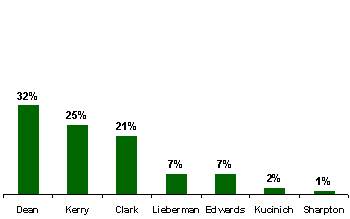PRINCETON, NJ -- The initial findings from the 2004 CNN/USA Today/Gallup tracking poll in New Hampshire, with interviews completed prior to the announcement of the Iowa caucus results, show former Vermont Gov. Howard Dean in front with 32% support, followed by Massachusetts Sen. John Kerry at 25% and retired Gen. Wesley Clark at 21%.
| Likely New Hampshire Voters: If the Democratic Primary Were Held Today, Whom Would You Vote For? |
 |
| Jan. 17-19, 2004 |
Connecticut Sen. Joe Lieberman and North Carolina Sen. John Edwards receive 7% support each. (Missouri Congressman Richard Gephardt dropped out of the presidential race on Tuesday, after coming in a poor fourth in Iowa. His support in this poll has been allocated to other candidates based on the respondents' second choices.)
In the wake of the Iowa caucuses, the contest in New Hampshire is likely to undergo a major transformation. Kerry is in a good position to capitalize on the positive publicity his victory in Iowa will engender, as he trails Dean by only seven percentage points. While Edwards is also likely to get a great deal of favorable publicity for his second-place showing, he starts out so far behind that it will be difficult for him to move to the front ranks. Still, after a second-place showing in Iowa in 1984, Gary Hart surged to victory in New Hampshire -- though he had trailed Walter Mondale by more than 20 percentage points in the Granite State prior to the Iowa caucuses. Mondale won the Iowa caucuses by a 3-to-1 margin over Hart.
One of the key questions about the importance of the Iowa caucuses may be answered this week by Clark, who skipped Iowa because of a late start in announcing his candidacy. Clark recently moved into a virtual tie with Kerry for second place in New Hampshire. Will Clark's efforts be overwhelmed by the publicity coming out of Iowa for Kerry and Edwards, or will Clark now be seen as an alternative to Dean, whose third place in Iowa was much worse than what the earlier pre-election polls had shown?
While some pundits have suggested that Dean will be severely hurt in New Hampshire because of Iowa, Dean may take some comfort from Michael Dukakis' experience in 1988. The governor from neighboring Massachusetts survived a third-place showing in Iowa to maintain his lead in New Hampshire and eventually won the Democratic nomination for president.
Survey Methods
New Hampshire tracking results are based on telephone interviews with approximately 280 New Hampshire residents per night who say they plan to vote in the Democratic primary on Jan. 27. Results are reported in three-day rolling averages.
The most recent results are based on interviews conducted Jan. 17-19, 2004, with 657 New Hampshire residents deemed most likely to vote in the Democratic primary. For this sample, the maximum margin of error attributable to sampling is ±4 percentage points.
The likely voter model assumes a turnout rate of 60% of those who say they plan to vote in the Democratic presidential primary, approximately 25% of New Hampshire adults. The likely voter results are weighted to match this assumption (weighted sample size is 498).
All results reported here are based on likely voters.
|
Plan to vote in |
Likely |
Margin of Error, |
||
|
2004 Jan 17-19 ^ |
854 |
657 |
±4 |
|
|
^ |
NOTE: All interviews conducted on Jan. 19 were completed before the results of the Iowa caucuses were reported. |
|||